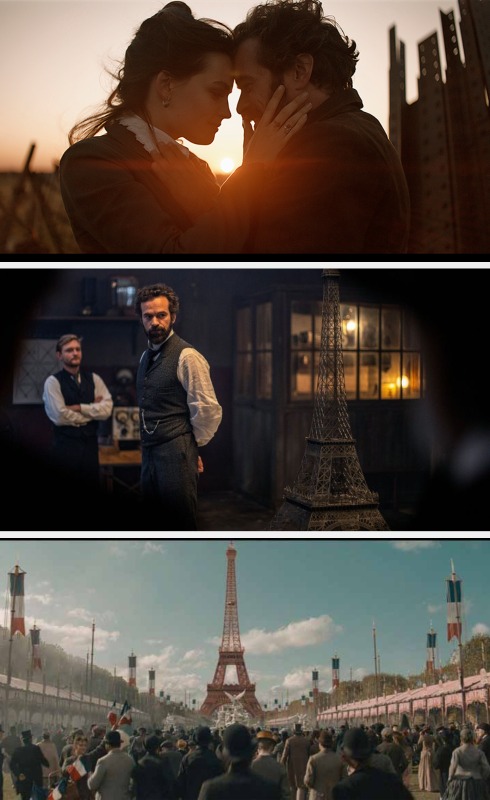 EIFFEL. Romain Duris and Emma Mackey. Also, Pierre Deladonchamps and Armande Boulanger. Directed by Martin Bourboulon. Rated M (Sex and nudity). 108 min.
EIFFEL. Romain Duris and Emma Mackey. Also, Pierre Deladonchamps and Armande Boulanger. Directed by Martin Bourboulon. Rated M (Sex and nudity). 108 min.
The film’s story is inspired by factual events associated with the construction of the Eiffel Tower for the 1889 Paris World Fair. The Tower is recognised world-wide as an extraordinary structure.
In the lead up to the World Fair, the French government indicated that it wanted a spectacular edifice for people to remember. It asked a talented, visionary French engineer, Gustave Eiffel (Duris) to fulfil its dream. Eiffel began by designing a subway, after being honoured for his engineering contribution to the building of the Statue of Liberty in the United States of America.
In the middle of planning for the project, Gustave rekindles a love relationship with a woman from his past, Adrienne Bourges (Mackey), and which changed the direction of his thinking.
The film embeds a story of romance within the context of how the Eiffel Tower was technically created. The film deals with the conflicts endured to create it (both personal and artistic), and the obsession that drove Gustave Eiffel to finish a Tower which stands completed as an icon of French engineering and artistry. The film moves freely between the late 1880s and the period before, when Gustave first met Adrienne Bourges in Bordeaux, where they fell rapturously in love. Adrienne was of marrying age, but her parents rejected Gustave as a suitable person.
Some 20 years later, Gustave has married, had children, and is widowed. Adrienne has wed a politician, who has professional influence over Eiffel’s plans to build his tower. Gustave finds himself battling personal angst, the bureaucracy of city officials, financial stress, the resistance of bureaucrats, a passionate love for Adrienne, a jealous husband, and the varying sentiments of the people of Paris. One problem looms as major: Adrienne’s husband is aware of his wife’s love, and he controls Gustave’s plan to build the Tower.
There is a Merchant-Ivory touch to the film in its depiction of the romance between Gustave and Adrienne. Sumptuous period costuming is used to highlight their romance, and Emma Mackey is luminous as Adrienne Bourges. A major strength of the film lies in the actual details of how the Eiffel Tower was constructed, and the film exposes us to fascinating technical information. There is spectacular aerial photography of the tower’s heights; we learn which tower’s segments were joined mid-air in exact alignment to each other; and we learn the way in which the tower’s foundations were engineered to handle the sand and mud of the River Seine.
The film celebrates French engineering and artistry, and is set in a context of a period drama, which offers information about the Tower that is rich in detail. The film tells two parallel stories involving passion – the lovers’ passion for each other, and Gustave Eiffel’s passion for building the Tower – and places them together, one nearly destroying the other.
The Tower itself survived multiple protests, personal frictions, and political intrigue to emerge as a unique architectural representation of France’s national standing. The film is an engrossing story of a structure many didn’t want, that is now an edifice the world greatly respects and admires.
The film uses flashbacks cleverly to project the tension between the building of the Eiffel Tower, and the expression of romantic love; and the symbolic meaning of a Tower, built in the shape of an ‘A’, is effectively communicated.
The film is a stirringly told dramatic piece of cinema about a world-famous, instantly recognisable edifice.
StudioCanal
Released in cinemas 27 August 2021